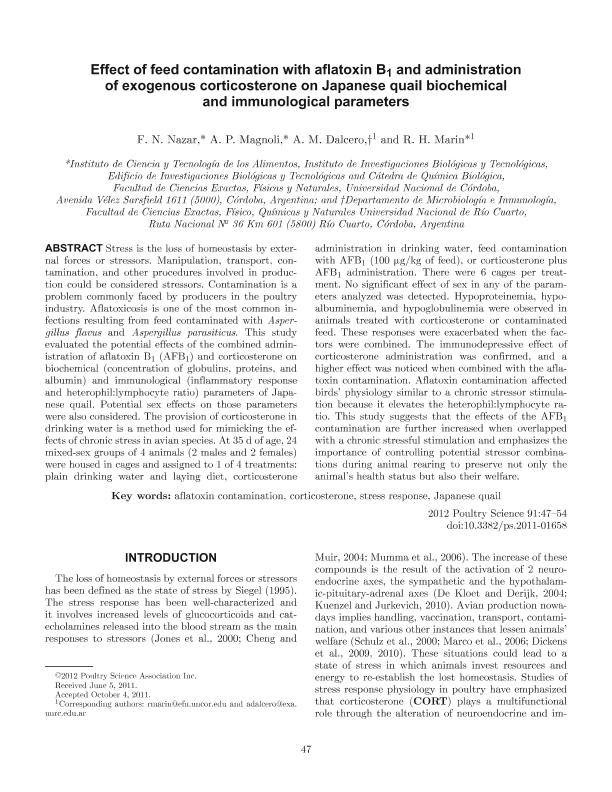Artículo
Effect of feed contamination with aflatoxin B1 and administration of exogenous corticosterone on Japanese quail biochemical and immunological parameters
Fecha de publicación:
01/01/2012
Editorial:
Poultry Science Association
Revista:
Poultry Science
ISSN:
0032-5791
e-ISSN:
1525-3171
Idioma:
Inglés
Tipo de recurso:
Artículo publicado
Clasificación temática:
Resumen
Stress is the loss of homeostasis by external forces or stressors. Manipulation, transport, contamination, and other procedures involved in production could be considered stressors. Contamination is a problem commonly faced by producers in the poultry industry. Aflatoxicosis is one of the most common infections resulting from feed contaminated with Aspergillus flavus and Aspergillus parasiticus. This study evaluated the potential effects of the combined administration of aflatoxin B1 (AFB1) and corticosterone on biochemical (concentration of globulins, proteins, and albumin) and immunological (inflammatory response and heterophil:lymphocyte ratio) parameters of Japanese quail. Potential sex effects on those parameters were also considered. The provision of corticosterone in drinking water is a method used for mimicking the effects of chronic stress in avian species. At 35 d of age, 24 mixed-sex groups of 4 animals (2 males and 2 females) were housed in cages and assigned to 1 of 4 treatments: plain drinking water and laying diet, corticosterone administration in drinking water, feed contamination with AFB1 (100 μg/kg of feed), or corticosterone plus AFB1 administration. There were 6 cages per treatment. No significant effect of sex in any of the parameters analyzed was detected. Hypoproteinemia, hypoalbuminemia, and hypoglobulinemia were observed in animals treated with corticosterone or contaminated feed. These responses were exacerbated when the factors were combined. The immunodepressive effect of corticosterone administration was confirmed, and a higher effect was noticed when combined with the aflatoxin contamination. Aflatoxin contamination affected birds’ physiology similar to a chronic stressor stimulation because it elevates the heterophil:lymphocyte ratio. This study suggests that the effects of the AFB1 contamination are further increased when overlapped with a chronic stressful stimulation and emphasizes the importance of controlling potential stressor combinations during animal rearing to preserve not only the animal's health status but also their welfare.
Palabras clave:
AFLATOXIN CONTAMINATION
,
CORTICOSTERONE
,
STRESS RESPONSE
,
JAPANESE QUAIL
Archivos asociados
Licencia
Identificadores
Colecciones
Articulos(CCT - CORDOBA)
Articulos de CTRO.CIENTIFICO TECNOL.CONICET - CORDOBA
Articulos de CTRO.CIENTIFICO TECNOL.CONICET - CORDOBA
Articulos(IIBYT)
Articulos de INSTITUTO DE INVESTIGACIONES BIOLOGICAS Y TECNOLOGICAS
Articulos de INSTITUTO DE INVESTIGACIONES BIOLOGICAS Y TECNOLOGICAS
Citación
Nazar, Franco Nicolas; Magnoli, Alejandra Paola; Dalcero, Ana Maria; Marin, Raul Hector; Effect of feed contamination with aflatoxin B1 and administration of exogenous corticosterone on Japanese quail biochemical and immunological parameters; Poultry Science Association; Poultry Science; 91; 1; 1-1-2012; 47-54
Compartir
Altmétricas




